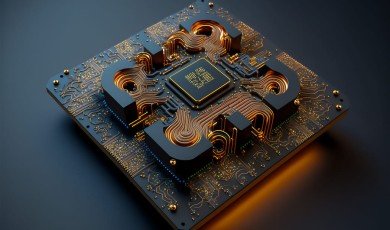
Quantum computing is no longer a distant dream confined to research labs — it’s rapidly becoming the foundation of a new technological revolution. As artificial intelligence (AI) continues to evolve, the integration of quantum computing is redefining what’s possible in terms of speed, precision, and problem-solving capacity. Together, these two fields are transforming industries, from finance and healthcare to communication and language technology.
Understanding Quantum Computing and Its Power
Unlike traditional computers that use bits as the smallest unit of information (either 0 or 1), quantum computers use qubits, which can exist in multiple states at once thanks to the principles of superposition and entanglement. This allows them to perform millions of calculations simultaneously.
The result? An exponential increase in computing power that makes even the most advanced classical systems look limited. Where conventional AI systems might take hours or even days to process complex data, quantum-enhanced AI could do it in seconds. This leap forward is not just about speed — it’s about possibility. Quantum computing opens doors to solving problems that were previously unsolvable, such as molecular simulations for drug discovery, optimizing global logistics, or developing AI models capable of understanding human language on a deeper level.
The Intersection of Quantum Computing and AI
Artificial intelligence relies on massive datasets and complex algorithms. Training deep learning models, for example, requires enormous computational resources. Quantum computing can drastically accelerate this process, enabling AI systems to process data more efficiently and learn from it faster.
Quantum machine learning (QML) — the fusion of quantum computing and AI — is one of the most exciting frontiers in technology today. It allows algorithms to analyze patterns within multidimensional data far beyond the reach of classical computers. This breakthrough will lead to AI systems that are not only faster but also smarter, capable of making nuanced decisions with far greater accuracy.
Imagine AI tools that can translate context, tone, and emotion across languages with near-human precision — an advancement that would revolutionize global communication and industries like localization and interpretation. Even a modern translation agencies could use quantum-powered AI to analyze massive linguistic databases in real time, improving accuracy and efficiency across hundreds of languages simultaneously.
Real-World Applications Already Emerging
The potential of quantum computing and AI isn’t limited to theory — it’s already being explored in practice. Major technology giants and research institutions are racing to develop usable quantum systems that can support real-world applications:
-
Healthcare: Quantum-enhanced AI can analyze genomic data at an unprecedented scale, leading to faster disease detection and personalized medicine.
-
Finance: Banks and investment firms are experimenting with quantum algorithms to model risk and predict market behavior more precisely.
-
Climate Science: Quantum simulations could help scientists model complex environmental systems and find new ways to combat climate change.
-
Cybersecurity: With quantum cryptography, data protection reaches a new level, creating virtually unbreakable encryption systems.
These advancements will also ripple into industries focused on communication, education, and digital transformation. For instance, a global translation company could use quantum AI to power instant multilingual interactions with contextual understanding — bridging cultures, not just words.
The Evolution of AI Through Quantum Speed
Traditional AI models, while powerful, still struggle with certain limitations: they can be biased, energy-intensive, and slow when processing extremely large data sets. Quantum computing offers solutions to all three challenges. With its ability to process complex data structures in parallel, quantum AI could significantly reduce energy consumption while increasing performance. Training massive language models — like those that power digital assistants or machine translation systems — could become faster and far more efficient.
The result would be smarter AI that continuously learns, adapts, and interacts naturally with humans, improving everything from customer support bots to advanced research platforms.
Challenges on the Road Ahead
As with any major technological leap, quantum computing comes with its share of challenges. The technology is still in its infancy, requiring highly stable environments and specialized equipment to maintain qubits in their delicate quantum states.
Moreover, the software ecosystem is still developing. Quantum programming demands entirely new frameworks and algorithms that differ radically from classical computing logic. This means businesses must invest in training and innovation to fully harness its potential. There’s also the question of accessibility. Quantum computers are currently expensive to build and operate. However, as with most technologies, costs are expected to fall dramatically over the next decade as research advances and commercialization increases.
Ethical and Societal Implications
The rise of quantum AI also introduces ethical considerations. As systems become capable of making faster, more autonomous decisions, maintaining human oversight becomes crucial. Data privacy, algorithmic transparency, and accountability must remain central to technological progress.
Organizations adopting quantum-powered AI will need to ensure that innovation serves humanity’s best interests — enhancing lives, not replacing them.
The Future: A Quantum Leap for Humanity
The convergence of quantum computing and AI represents one of the greatest paradigm shifts of our time. Just as the internet reshaped communication and digitalization transformed industry, quantum technology is poised to redefine the very concept of intelligence.
In the coming years, businesses that understand and adopt these innovations early will gain a powerful advantage. Those that combine technical expertise with ethical responsibility will shape not just markets, but the future of human progress itself. Quantum AI has the potential to revolutionize medicine, education, translation, and beyond. It’s not about replacing human intelligence but amplifying it — helping societies solve challenges too complex for current technologies.
The Quantum-AI Synergy Begins
Quantum computing is setting the stage for a new generation of artificial intelligence — one that’s faster, more adaptive, and capable of reasoning at levels once thought impossible. From global corporations to startups, the race is on to unlock this potential. Whether it’s accelerating research, securing communications, or empowering a translation company to deliver flawless multilingual understanding in real time, the quantum revolution is already unfolding. The fusion of quantum computing and AI isn’t just an upgrade — it’s a reinvention of technology itself. And it’s only the beginning.








